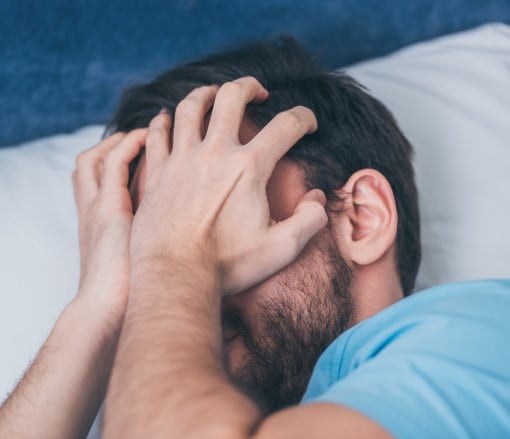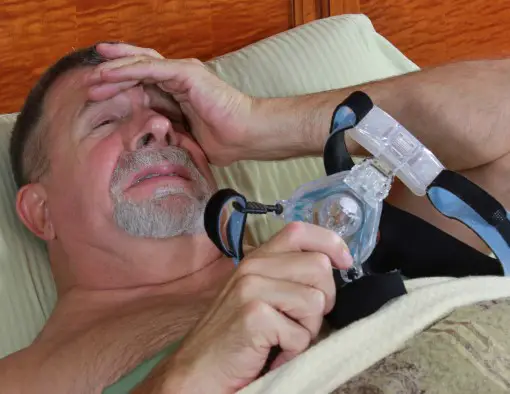
Can sleep apnea cause acne? – Why it might and 9 practical remedies
By Jason Wooden, PhD | September 19, 2022
While sleep apnea patients are more at risk for atopic dermatitis and psoriasis, there’s currently no evidence that sleep apnea can directly cause acne. However, the stress and poor sleep from sleep apnea could possibly trigger or worsen an acne outbreak. Fortunately, there are plenty of practical remedies you can try if you suspect sleep apnea is the cause.
Why it’s so frustrating if sleep apnea is causing acne
So, you suspect sleep apnea is causing you to have acne flare ups?
Maybe your acne only started after you got sleep apnea or perhaps you’ve noticed you’re experiencing more outbreaks than you used to…
All the same, sleep apnea by itself can be frustrating enough.
Waking up every hour throughout the night, frequent trips to the bathroom, complaints of loud snoring…
In the morning you feel as if you haven’t slept at all and you spend the rest of the day as a sleep-deprived zombie.
Add acne to mix and the frustration meter goes up another notch.
There’s no hard numbers on how many people with sleep apnea struggle with acne. However, with somewhere around a billion sleep apnea sufferers, you’re likely not the first to wonder if there’s a connection.

So, it’s totally natural to want to know what’s causing it and if there’s anything you can do about it.
Can sleep apnea really cause you acne break outs?
We’re going to take a look at what and what you can do about it.
The connection between sleep apnea and acne
Sleep apnea is a condition in which your breathing is repeatedly interrupted during sleep. As you become more oxygen deprived, your brain arouses you out of deep sleep into a lighter sleep to help you resume breathing.
Acne is caused by hair follicles under skin getting clogged and inflamed which leads to outbreaks of skin lesions.
So, with one there’s something wrong with your breathing and with the other it’s your skin.

Could sleep apnea breathing interruptions also trigger acne outbreaks?
Studies have shown that sleep apnea can affect your skin.
Patients with obstructive sleep apnea, the most common type, are at an increased risk for atopic dermatitis (dry, itchy and inflamed skin) later in life. They are also four times more likely to suffer from psoriasis (patches of thick red skin and silvery scales) than the general population.
So, it’s not unheard of for people with sleep apnea see skin changes. However, there’s currently no evidence that sleep apnea can directly cause acne.
The stress and poor sleep from sleep apnea may cause acne
Did you know stress and poor sleep are major risk factors for acne.
Emotional stress can trigger or worsen acne. In fact, studies show that as stress intensifies the severity of the acne increases.
In response to stress, the body produces hormones that stimulate glands to produce more oil which can make the skin oilier and greasier. This can lead to clogged pores and acne flare ups.

As many as 30 percent of dermatology cases are thought to involve a psychological problem.
Poor sleep can trigger or worsen acne. That’s not too surprising since poor sleep quality is believed to trigger higher levels of stress hormones and inflammation in the body.
So, it’s possible that sleep apnea could indirectly trigger an acne flareup since sleep apnea can increase your risk for stress, anxiety, and poor sleep.
Your sleep apnea treatment may be why you’re getting acne
There’s another way sleep apnea could indirectly trigger an acne flareup.
Are you currently using a CPAP machine at for your sleep apnea? The mask and headgear could be involved with your acne.
Look online in CPAP forums and you’ll find people complaining about tiny painful pimples on the face, nose, or back of the head.
Wearing items that place pressure on the skin is a known risk factor. Skin irritation from CPAP, including acne, is a common complaint.

Another way CPAP could trigger an acne flareup is if you find the experience extremely stressful. Some people find the mask uncomfortable and claustrophobic. It’s not uncommon for patients just starting treatment to have panic attacks.
If you’ve noticed you getting more acne outbreaks when you use your CPAP machine, it should certainly be on the list of suspects.
Other reasons beside sleep apnea you’re getting acne
I’ve already mentioned the link to sleep apnea stress and poor sleep. Other things besides sleep apnea to think about for acne include:
Pressure on the skin – Obviously, a CPAP mask isn’t the only item that could physically irritate the skin. Pressure from other items such as a sports helmets can do the same.
Smoking – Are you a regular smoker? There’s growing evidence for a link between smoking and acne. It’s bad for sleep apnea too.
Diet – Evidence is growing that a diet rich in refined carbs, dairy, and fat can make acne worse.
Medications – For poorly understood reasons, some medications can cause acne. The list includes corticosteroids, hormones, birth control, lithium, and some cancer drugs.
Hormones – Hormonal changes can trigger acne, especially during puberty in boys and girls. It can also be triggered during pregnancy or when oral contraceptives are used. (Birth control pills contain synthetic versions of the female sex hormones.)
What to do if you’re worried sleep apnea is the cause for your acne
Now that you know what you’re up against, we’re going to look at your options. The good news is that there’s plenty of things you can do to prevent acne breakouts if you suspect sleep apnea is the cause:
Your options include:
1) Improving your sleep hygiene
Since poor sleep is a major risk factor for acne and symptom of sleep apnea, it’s important to make the best of your sleep opportunities. That means you need to follow the basic rules of healthy sleep.
For better sleep hygiene, you should:
- Wake up and go to bed at the same time every day
- Exercise
- Avoid large meals, alcohol, and stimulants such as caffeine before bedtime
- Maintain a bedtime routine
- Avoid electronics (TVs, tablets, smartphones) near bedtime
- Keep your bedroom dark, cool, quiet, & relaxing
2) Stress management
Like poor sleep, stress is another major acne risk factor and symptom of sleep apnea. Everyday you need to do whatever you can to manage the stress in your life.
Avoid unnecessary stress, be realistic about what you can do, and set aside some time for fun. Other ways you
3) Staying hydrated
Making sure you’re adequately hydrated will help acne sores heal and reduce the risk of outbreaks.
4) Watch what you eat
An anti-inflammatory diet may be help for managing your sleep apnea.
Also, findings from studies suggest that a diet that avoids high-glycemic foods and dairy from cow can help reduce acne. Also, a diet rich in healthy nutritious foods are thought to be beneficial to skin.
Learn more:
Foods that help sleep apnea
Can the right diet get rid of acne? (Amer Academy of Dermatology)
5) Get your sleep apnea under control
Taking positive steps to manage your sleep apnea symptoms will help keep them from triggering acne flareups. At the top of the list for most people are weight loss and CPAP therapy.
6) Try an alternative to CPAP
If you suspect your CPAP setup is involved with your acne flare ups, you can try a CPAP alternative.
Learn more:
What to do if CPAP machine causing acne
The latest CPAP alternatives
7) Get a check up
A doctor can check for other underlying causes linked to poor sleep and sleep apnea. They can help you come up with an insomnia treatment plan that works for your specific issues.
8) See a dermatologist
Are you sure sleep apnea is the cause of your acne? A skin specialist can check for other causes and issues. They can make specific recommendations including things to do.
9) Acne medications
A doctor might recommend over-the-counter treatments such as salicylic acid and hydrogen peroxide. There are also stronger prescriptions meds.
You may also be interested in:
Sources:
1. Acne, NIH website
2. Acne Vulgaris: The Psychosocial & Psychological Burden Of Illness, 2013, hmpgloballearningnetwork.com
3. A global perspective on the epidemiology of acne. Br J Dermatol. 2015 Jul;172 Suppl 1:3-12.
4. Obstructive Sleep Apnea and the Risk of Atopic Dermatitis: A Population-Based Case Control Study. PLoS One. 2014 Feb 25;9(2):e89656.
5. Patients With Obstructive Sleep Apnea Are Over Four Times More Likely to Suffer From Psoriasis Than the General Population. J Clin Sleep Med. 2018 Jan 15;14(1):153.
6. The Impact of Pyschological Stress on Acne. Acta Dermatovenerol Croat. 2017 Jul;25(2):1133-141.
7. ACNE: WHO GETS AND CAUSES, American Academy of Dermatology Association.
8. How Does Stress Cause Acne?, 2021, MedicineNet
9. Sleep and Stress, 2022, The Sleep Doctor
10. How to Deal with Acne Related to CPAP, 2016, sleepomaha.com
Connect with us:
About Us
Better Sleep Simplified® was founded as a place for you to get clear and well-researched information.
Our goal is to make sure you know about your options so that you take action sooner rather than later.
Check us out on YouTube:
Watch and Learn
Helpful sleep tips, interesting sleep facts and statistics you want to know about
Affiliate Disclosure
This site is a participant in the Amazon Services LLC Associates Program and other affiliate advertising programs designed to provide a means for sites to earn advertising fees by advertising and linking to them.
Important: BetterSleepSimplified.com is for informational purposes only and is not intended or implied to be a substitute for professional medical advice, diagnosis, or treatment. Always consult a physician for sleep and health concerns. See additional information.
